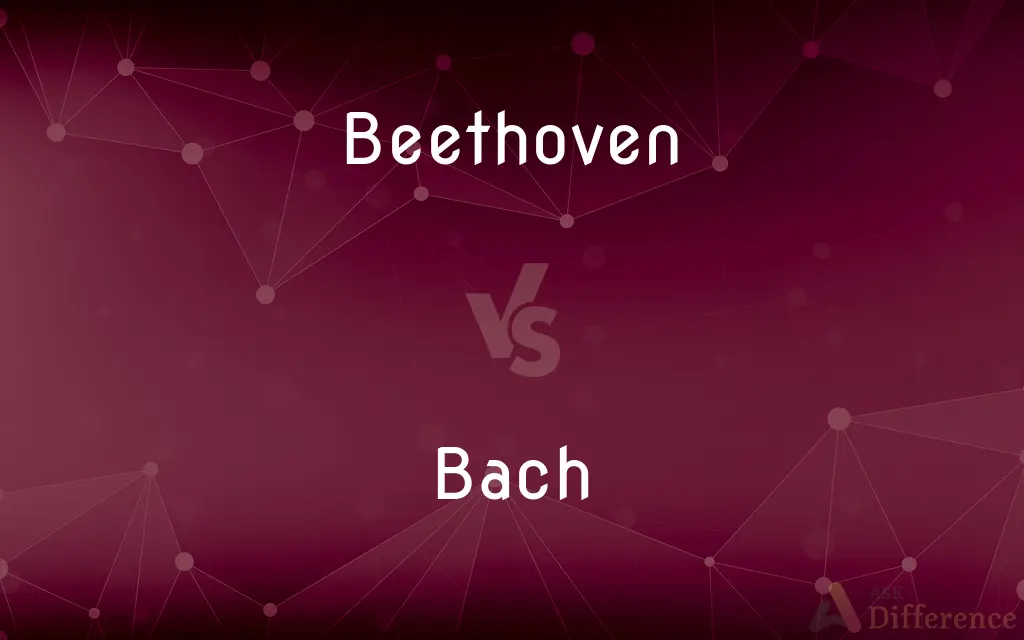Beethoven vs. Bach — What's the Difference?
By Urooj Arif & Fiza Rafique — Updated on March 16, 2024
Beethoven was a pivotal figure in the transition from the Classical to the Romantic era, known for emotional depth in music. Bach, a Baroque era composer, emphasized complex harmonies and counterpoint.

Difference Between Beethoven and Bach
Table of Contents
ADVERTISEMENT
Key Differences
Ludwig van Beethoven, active in the late 18th and early 19th centuries, is often celebrated for bridging the Classical and Romantic periods in Western music. His compositions, including symphonies, sonatas, and quartets, are noted for their emotional expressiveness, innovation, and the use of developing variation. Beethoven's work reflects personal struggle, notably his deafness, which deeply influenced his later compositions, making them more introspective and complex. Bach's music, characterized by its mathematical precision and spiritual depth, has had a profound influence on the Western musical canon, laying the groundwork for future composers, including Beethoven.
While Beethoven's compositions are celebrated for their emotional depth and innovative use of motifs, pushing the boundaries of musical form, Bach's work is revered for its technical mastery, complex textures, and polyphonic style. Beethoven often used music to express personal anguish and triumph, making his work deeply personal and emotionally resonant. In contrast, Bach's compositions, while also capable of great emotional depth, often sought to glorify God and explore the intricacies of musical form.
Beethoven's influence is particularly notable in the development of the symphony and sonata, where he expanded the scope and complexity of these forms, introducing novel concepts such as the cyclic integration of motifs across movements. Bach, on the other hand, is best remembered for his contributions to keyboard music and his development of the fugue, a form where a single theme is introduced by one part and successively taken up by others.
Both composers, though separated by time and stylistic periods, contributed uniquely to the evolution of Western classical music. Beethoven, with his profound impact on the Romantic era, and Bach, with his foundational role in the Baroque era, represent two towering figures whose works continue to inspire musicians and listeners alike.
Comparison Chart
Era
Classical-Romantic transition
Baroque
ADVERTISEMENT
Lifespan
1770-1827
1685-1750
Known For
Emotional depth, symphonies, sonatas
Counterpoint, fugues, sacred music
Musical Style
Expansive forms, thematic development
Complex harmonies, polyphony
Contributions
Bridged Classical and Romantic eras, symphonic innovation
Developed fugue, keyboard music, complex harmonic language
Personal Struggles
Deafness affecting later works
Professional and family responsibilities
Legacy
Emotional expressiveness, form expansion
Technical mastery, foundational work in Western music
Compare with Definitions
Beethoven
Pioneered the Romantic era with his expressive compositions.
Beethoven's Symphony No. 9 features the famous Ode to Joy.
Bach
Master of the Baroque era, known for his fugues.
The Well-Tempered Clavier is a landmark in keyboard music.
Beethoven
Overcame deafness to compose profound music.
He composed his late quartets, some of his greatest works, while completely deaf.
Bach
Pioneered the use of the well-tempered tuning system.
His compositions allowed for music to be played in all keys.
Beethoven
Known for thematic development and motif use.
The motif in Beethoven's Fifth Symphony is iconic.
Bach
Composed music for the glory of God.
Bach's Mass in B minor is one of the greatest works of sacred music.
Beethoven
Expanded the symphony and sonata forms.
His Moonlight Sonata remains one of the most popular piano pieces.
Bach
Influenced by his religious and family life.
Many of Bach's cantatas were composed for Lutheran church services.
Beethoven
Integrated personal emotion into his music.
His Pathétique Sonata is noted for its emotional depth.
Bach
Utilized complex counterpoint and harmonies.
The Brandenburg Concertos showcase his skill in polyphonic textures.
Beethoven
Ludwig van Beethoven, a renowned German composer, born 1770, died 1827.
Bach
A bachelor.
Beethoven
The music of Beethoven.
Bach
To live as a bachelor.
Beethoven
German composer of instrumental music (especially symphonic and chamber music); continued to compose after he lost his hearing (1770-1827)
Bach
To live in the manner of a bachelor, as when one's spouse or partner is away.
Beethoven
The music of Beethoven;
He enjoyed Beethoven most of all
Bach
A holiday home, usually small and near the beach, often with only one or two rooms and of simple construction.
Bach
(US) To live apart from women, as during the period when a divorce is in progress. (Compare bachelor pad.)
Bach
German baroque organist and contrapuntist; composed mostly keyboard music; one of the greatest creators of Western music (1685-1750)
Bach
The music of Bach;
He played Bach on the organ
Bach
Lead a bachelor's existence
Common Curiosities
What distinguishes Beethoven's music?
Beethoven's music is distinguished by its emotional depth, innovative form expansion, and thematic development, reflecting his personal struggles and triumphs.
What era did Beethoven transition?
Beethoven was pivotal in the transition from the Classical to the Romantic era in Western music.
What are some key differences in the themes of Beethoven's and Bach's works?
Beethoven's themes often revolve around personal struggle and emotional expression, while Bach's work frequently explores religious devotion and the intricacies of musical form.
Can you compare Beethoven's and Bach's contributions to specific musical forms?
Beethoven expanded the symphony and sonata, introducing novel structural concepts, while Bach developed the fugue and enriched keyboard music with his complex compositions.
What is Bach known for in Baroque music?
Bach is known for his intricate use of counterpoint, mastery of fugue, and contributions to sacred and keyboard music within the Baroque era.
How did Beethoven and Bach's personal lives influence their music?
Beethoven's music was deeply affected by his deafness, leading to more introspective compositions, while Bach's religious devotion and family life influenced his prolific output of sacred music.
What legacy did Beethoven leave for future composers?
Beethoven's legacy for future composers includes his emotional expressiveness, form expansion, and the integration of personal narrative into music.
How is Bach's music foundational to Western classical music?
Bach's music is foundational due to his technical mastery, his development of musical forms like the fugue, and his influence on the harmonic language of Western music.
How did Bach influence music?
Bach influenced music through his mastery of counterpoint and harmony, foundational contributions to keyboard music, and the development of the fugue.
How do Beethoven and Bach's contributions to keyboard music differ?
Beethoven is celebrated for his sonatas that expanded expressive possibilities, while Bach's contributions include the structuring of preludes and fugues, enhancing the technical and expressive scope of keyboard music.
Share Your Discovery

Previous Comparison
Naive vs. Innocent
Next Comparison
Jaundice vs. IcterusAuthor Spotlight
Written by
Urooj ArifUrooj is a skilled content writer at Ask Difference, known for her exceptional ability to simplify complex topics into engaging and informative content. With a passion for research and a flair for clear, concise writing, she consistently delivers articles that resonate with our diverse audience.
Co-written by
Fiza RafiqueFiza Rafique is a skilled content writer at AskDifference.com, where she meticulously refines and enhances written pieces. Drawing from her vast editorial expertise, Fiza ensures clarity, accuracy, and precision in every article. Passionate about language, she continually seeks to elevate the quality of content for readers worldwide.















































